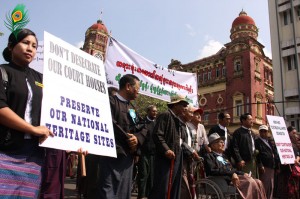15-21 October: No More Than a Semblance of Freedom of Assembly, Association and Expression
October 22, 2012 Like many of Burma’s other reforms including the easing of restrictions on media, there is a darker side to the semblance of freedom of assembly, association and expression that has recently been commended in Burma.
Like many of Burma’s other reforms including the easing of restrictions on media, there is a darker side to the semblance of freedom of assembly, association and expression that has recently been commended in Burma.
President Thein Sein’s office has been urging ministries to remove some 4,000 people remaining on the blacklist. However, some returning exiles have been asked to sign agreements that they will not do anything that could “harm the state.” The agreement says that exiles can repay the government’s “generosity” by avoiding actions that would disrespect the government and not participate in actions or publish anything that would harm the country’s stability, which hark back to language used by the military regime.
Within the country, lawyers, activists, farmers and local villagers have been protesting on a range of crucial issues including land confiscation, mining projects, electricity shortages, the preservation of cultural heritage buildings in Rangoon and the need for nationwide peace. Those who speak out on issues that are sensitive to the government are detained, charged or threatened by authorities. One of the biggest cases at the moment is that of the thirteen organizers of the peace protest on 21 September who are facing court cases in 10 different Rangoon townships for protesting without permission. They are required to appear at court hearings nearly every day and must inform the authorities if they plan to leave Rangoon.
Meanwhile, on 15 October, thousands of monks and laypeople demonstrated in four cities against the Organization of Islamic Cooperation’s plan to open an office in Rangoon to provide aid to Muslims displaced by sectarian violence in Arakan State since June. The protest was not stopped by authorities, nor has there been any news of the organizers or participants facing charges for protesting without permission. In fact, the government decided to heed the protesters calls and said that it would not allow the OIC to open an office “as it is contradictory to the aspirations of the people.”
There is a clear double standard when it comes to the government’s response to the calls of protesters. It has not supported the aspirations of the people for nationwide peace, expressed at the protest on 21 September and countless events in Rangoon, Bangkok and around the world. Rather, armed conflict rages in Kachin State where ceasefire negotiations have been stalled for months, clashes continue in both Shan State Army – North and South territories and the Burma Army has continued to increase the number of troops in Karenni State.
The Peaceful Demonstration and Gathering Law passed in December 2011 does little to protect demonstrators, but rather gives the government the legal framework within which it can arrest peaceful protesters. The law requires that protesters obtain permission five days in advance of any assembly or protest and submit slogans for approval. The law also requires that every person who is going to participate must apply for permission. Rather than protecting the right to protest, this law gives the authorities the contact information and details they need to file cases and detain protesters that they want to silent.
As long as laws like the Peaceful Demonstration and Gathering Law, the Unlawful Associations Act and the NGO Registration Law remain in place, there will be no guaranteed freedom of assembly, association and expression in Burma. These are crucial laws that international donors who support the reform process must encourage the government to repeal and amend; these would be clear indicators that reform of the country’s legal system is on the right track to protecting the fundamental freedoms of its citizens.
News Highlights
USDP reappoints Thein Sein as chairman of the party, who holds a rare press conference in Naypyidaw
NLD to probe whether reappointment Thein Sein breaches the constitution
Inside Burma
NLD plans to hold a youth assembly later this year
The Kachin Independence Organization accepts to meet the government peace team in Ruili, China; Burma Army kills three civilians in Hpakant and shoots a child in a Chinese refugee camp
About 50 participants attend a conference in Rangoon on corporate social responsibility
Regional
Daw Aung San Suu Kyi to visit India for one week in November
About 200,000 undocumented migrant workers from Burma face deportation from Thailand
International
The Pentagon denies reports that the US would be resuming a defense relationship; Burma is invited to a major US and Thai-led multinational military exercise
Burma’s Foreign Minister Wunna Maung Lwin visits New Zealand to further economic and diplomatic ties
Opinions
The Jade War
By Swe Win
The New York Times
Women Sidelined From Burma’s Fledgling Peace Process
By Ismail Wolff
Insight on Conflict
New Investments and Unresolved Conflicts
By Andrea Gittleman
Democratic Voice of Burma
Latest From the Blog
New Lending Must Address Challenges on Burma’s Road to Development
By Burma Partnership
Actions
About 100 people in Kawthaung, Tenasserim Division, protest against a new coal power plant
Statements and Press Releases
Burma: AHRC Expresses Solidarity With Protesting Farmers
By Asian Human Rights Commission
A Community Leader Jailed in Burma – Free Tun Aung
By Burma Campaign UK
New Report Highlights Mon IDP Perspectives on Resettlement
By Human Rights Foundation of Monland
Reports
Not in Theory, Not in Practice: Freedom of Assembly and Association in Burma
By Burma Partnership
Destination Unknown: Hope and Doubt Regarding IDP Resettlement in Mon State
By Human Rights Foundation of Monland
This post is in: Weekly Highlights









 All posts
All posts